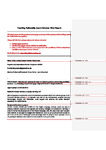‘Feed-forward: Exploring the staff and student experience of technology facilitated feedback - can technology support and engage staff and students in dialogic feedback?’
| dc.contributor.author | Lowes, R | |
| dc.contributor.author | Purnell, E | |
| dc.contributor.author | Bowstead, H | |
| dc.contributor.other | Faculty of Business | en_US |
| dc.date.accessioned | 2019-03-20T11:28:18Z | |
| dc.date.available | 2019-03-20T11:28:18Z | |
| dc.date.issued | 2015 | |
| dc.identifier.uri | http://hdl.handle.net/10026.1/13501 | |
| dc.description | File replaced (incorrect version) on 01/08/2022 by KT (LDS). | |
| dc.description.abstract |
Aims of project: to explore the use of new feedback processes within four module groups in the Plymouth Business School; to evaluate how two of the institutionally provided learning technologies, Moodle and PebblePad, could support and enhance the online feedback experience for staff/students. Background/context to project: ELC101, ELC201, ELC305 and ELC307 are four English language modules where we seek to develop students’ capacity to self-regulate and develop strategies for autonomous learning, in order to further the development of their English language skills. We have noted over the years that students do not seem to engage with feedback as much as we would wish and wanted to see if use of the DLE / Pebblepad would encourage them to adopt a more proactive role in responding to feedback. Both platforms allow students to respond online. | en_US |
| dc.description.sponsorship | TFAS | en_US |
| dc.language.iso | en | |
| dc.publisher | University of Plymouth | en |
| dc.subject | dialogic feedback; language learning; DLE | en_US |
| dc.title | ‘Feed-forward: Exploring the staff and student experience of technology facilitated feedback - can technology support and engage staff and students in dialogic feedback?’ | en_US |
| dc.type | Report | en_US |
| plymouth.date-start | 2014-2015 | en_US |


